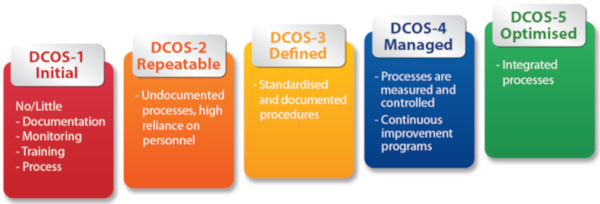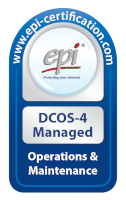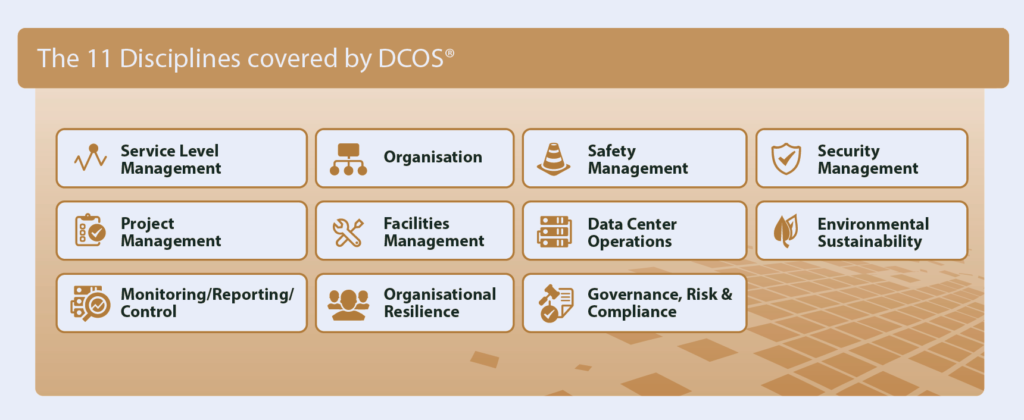DCOS and other data center standards
Why did we choose EPI-DCOS certification for Atman DC WAW-1 and WAW-2?
 Atman has a high quality DC infrastructure which—during audits carried out by our clients—easily shows compliance with the requirements of Tier III Uptime Institute standard, and even exceeds them in some elements. We do not see (at least for now) a business justification for investing in the costly certification of the physical infrastructure of our facilities.
Atman has a high quality DC infrastructure which—during audits carried out by our clients—easily shows compliance with the requirements of Tier III Uptime Institute standard, and even exceeds them in some elements. We do not see (at least for now) a business justification for investing in the costly certification of the physical infrastructure of our facilities.
When it comes to the DC operational management, so far we have applied the procedures according to ISO 9001 and ISO/IEC 27001 standards (we have been certified for compliance for many years). However, we were aware that there was always room for refinement or improvement in the areas of management, service and processes. Therefore, we decided to implement a practical standard developed especially for the data center to get even higher availability of services (colocation, dedicated servers, cloud computing, etc.) for our clients.
Most standards that directly relate to DC deal primarily (or exclusively) with the infrastructure layer of this type of facility. Elements such as the design and construction of the facility as well as the systems that constitute the DC equipment are assessed for redundancy which is to ensure the exclusion of a single point of failure. Few also deal with management and operations in the data center, but only one standard, i.e. EPI-DCOS, focuses exclusively on codifying the maintenance and operational procedures of the data center and is the only one that does it comprehensively and exhaustively.
EPI-DCOS
EPI’s DCOS is the only standard in the world defining the correct and effective procedures that should be implemented in data center facilities. Thanks to them, the services provided in such facility are well defined, maintain a constant level of quality and high availability.
EPI-DCOS certification distinguishes and describes 11 disciplines of data center management, including: DC operational procedures, management of both physical security of the facility and work safety in the DC, facility upkeep and maintenance procedures, monitoring, reporting and control, as well as ecological sustainability. In addition, it helps to organize the management of suppliers, technical staff and their training, as well as the management of service level, projects. It also looks at the organization itself, its flexibility to market changes, organizational order, risk, and compliance with regulations.
Practical, detailed DCOS guidelines help DC operators to develop and implement procedures tailored to their facility, while also offering ready lists of periodic reviews. The standard also requires that the application of the procedures be documented. Regular analysis of current events combined with the verification of the procedures is to ensure constant care of their suitability and quality.
All this is aimed at the efficient functioning of the data center, because, on the one hand, it seals the processes related to the facility management, preparing it for almost any circumstances, and, on the other hand, it standardizes operations in the DC leaving nothing to guess or coincidence, thus minimizing the possibility of error human.
The unique advantage of the DCOS standard is that it allows the DC operator to identify disciplines that will be certified. The operator can first select those disciplines that are key from their point of view and focus on adapting this range of procedures to the requirements of the standard. If necessary, the operator can gradually expand the DCOS certification to other disciplines.
The DCOS classification is five-level, defining the so-called maturity levels: 1-Initial, 2-Repeatable, 3-Defined, 4-Managed, 5-Opimised. The audit not only evaluates the general level of maturity of data center management, but also the DC maturity in each of the certified areas. Importantly, the DCOS-5 certification is only possible if all 11 management disciplines are found to be in compliance. Atman received the highest rating in each of the four certified disciplines (see Atman’s certificates).

The EPI-DCOS standard is based on the methodology of ANSI/TIA and ISO standards. Its guidelines are public and available to interested parties.
ANSI/TIA-942
The popular standard in Europe for ANSI/TIA-942 data centers covers all issues related to the physical layer of the data center, such as location, architectural design, security, protection, as well as power supply, telecommunications and fire protection systems. The requirements of this standard are public and available to all interested parties.
Types of the ANSI/TIA-942 certification:
- ANSI/TIA-942 Design Certification
- ANSI/TIA-942 Site Certification
- ANSI/TIA-942 Ready (for modular data centers, e.g. containerized)
The classification in this standard is four-level, from Rated-1: Basic Site Infrastructure (limited protection against physical events) to Rated-4: Fault Tolerant Site Infrastructure (protection against almost all physical events).
ANSI/TIA-942 does not deal with any operations or processes in the data center.
Uptime Institute
Uptime Institute offers three types of Tier certification:
- Data Center Design Documents
- Constructed Data Center Facility
- Data Center Operational Sustainability
as well as a special “TIER-Ready for Prefabricated and Modular Data Centers” certificate for modular objects.
The classification is four-level, from Tier I to Tier IV.
Notably, only data centers that have received both the “Design” and “Facility” certificates can apply for certification in the field of operations.
Already operating data centers, which inevitably have no chance of obtaining any of the above certificates, Uptime Institute offers participation in the M&O Stamp of Approval Program. Unfortunately, the set of guidelines does not cover all data center processes, and some of them are described in a very general way. An important disadvantage is the confidentiality of the full audit criteria, as well as the lack of the possibility of partial certification and grading of compliance with the requirements of M&O Stamp of Approval.
ISO
ISO standards describe processes quite universally, which is why some standards can be partly related to data center management. However, they do not cover the full spectrum of operations related to the maintenance and operation of this type of facility.
The criteria of the standards are public and available to interested parties; there is no possibility of partial certification or compliance grading.
 Summary
Summary
Atman’s EPI-DCOS certification is unique throughout Europe. According to the classification, DCOS level 4 certificates for Atman’s data centers in Warsaw guarantee that the procedures implemented in them are well defined and their quality is constantly monitored, which—combined with high-quality infrastructure—translates into business continuity and reliability of services used by our clients.
Read also:
Atman’s Warsaw data centers gain Europe’s first EPI-DCOS certification





 The website uses cookies as described in our
The website uses cookies as described in our 